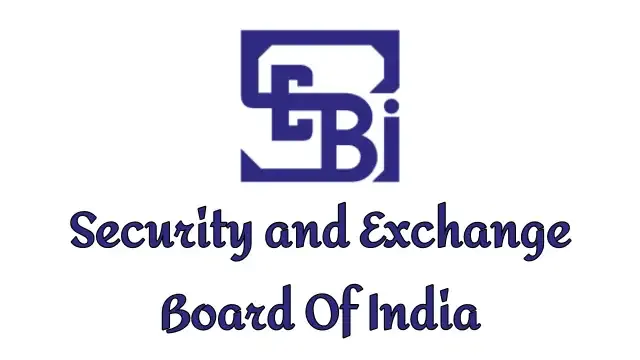SEBI, which stands for the Securities and Exchange Board of India, plays a crucial role in regulating and overseeing the securities market in India. It is a statutory regulatory body established to protect the interests of investors and promote the development of the securities market. In this article, we will delve into the origins, functions, and significance of SEBI, uncovering its full form and exploring its impact on the Indian securities market.
The Origin and Evolution of SEBI
SEBI was established in 1988 as a non-statutory body and later became a statutory organization with the passing of the SEBI Act in 1992. Its formation was prompted by the need for a unified regulatory body to oversee and regulate the securities market, which was previously governed by multiple agencies. Over the years, SEBI has evolved and achieved significant milestones in its journey towards creating a transparent and well-regulated securities market in India.
SEBI's Regulatory Framework
SEBI operates under the purview of the Ministry of Finance, Government of India. It functions as an autonomous regulatory authority with a three-tiered structure consisting of a Board, various departments, and regional offices. SEBI's primary responsibility is to regulate and supervise the securities market and ensure the protection of investor interests. It formulates policies, issues regulations, and monitors market activities to maintain the integrity and fairness of the securities market.
The Full Form of SEBI
SEBI is an acronym that stands for Securities and Exchange Board of India. Let's decode the full form of SEBI and understand the meaning behind each component.
- Securities: Refers to financial instruments such as stocks, bonds, and derivatives that are traded in the securities market.
- Exchange: Signifies the marketplace where buyers and sellers come together to trade securities, such as stock exchanges or commodity exchanges.
- Board: Represents the governing body or regulatory authority responsible for overseeing and regulating the securities market.
- India: Indicates the geographical jurisdiction of SEBI, which is the Indian securities market.
SEBI's Regulatory Functions
SEBI performs several critical regulatory functions to ensure the smooth functioning and development of the securities market in India. Some of its key functions include:
- Market surveillance and monitoring: SEBI monitors market activities to detect and prevent manipulative practices, insider trading, and other fraudulent activities.
- Promoting fair practices and investor protection: SEBI formulates regulations to promote fair practices, transparency, and disclosure norms to protect the interests of investors.
- Regulating intermediaries and market participants: SEBI regulates various market intermediaries such as brokers, depositories, and investment advisors, ensuring their compliance with regulations.
- Facilitating the development of the securities market: SEBI takes initiatives to promote the growth and development of the securities market by introducing new financial instruments and encouraging technological advancements.
SEBI's Regulatory Tools and Mechanisms
SEBI employs various regulatory tools and mechanisms to enforce compliance and maintain market integrity. These include:
- Overview of SEBI's regulatory tools: SEBI issues guidelines, circulars, and notifications to regulate the conduct of market participants and ensure adherence to regulatory norms.
- Enforcement actions and penalties: SEBI has the authority to take enforcement actions against entities found in violation of regulations, including imposing penalties, disgorgement of ill-gotten gains, and initiating legal proceedings.
- Investor grievance redressal mechanisms: SEBI has established a robust grievance redressal mechanism to address investor complaints and ensure timely resolution of disputes.
SEBI's Impact on the Indian Securities Market
SEBI has played a pivotal role in transforming the Indian securities market. Some of the notable impacts of SEBI's regulations and initiatives include:
- Transformation of the securities market landscape: SEBI's regulations have contributed to the development of a transparent and well-regulated securities market, attracting domestic and foreign investors.
- Enhancing transparency and corporate governance: SEBI has introduced stringent disclosure requirements and corporate governance norms to enhance transparency and accountability in listed companies.
SEBI and Investor Protection
Investor protection is a key objective of SEBI. SEBI has implemented various measures to safeguard the interests of investors, including:
- Safeguarding the interests of investors: SEBI ensures that investors are provided with accurate and adequate information to make informed investment decisions. It also takes action against entities engaged in fraudulent activities.
- Measures taken by SEBI to protect investors: SEBI has introduced regulations such as Know Your Customer (KYC) norms, investor education programs, and strict norms for collective investment schemes to protect investors from potential risks.
SEBI's Role in Promoting Market Integrity
SEBI plays a crucial role in promoting market integrity by preventing fraudulent activities and market manipulation. It achieves this through the following measures:
- Preventing fraudulent activities and market manipulation: SEBI implements robust surveillance systems and investigates suspicious trading activities to detect and deter fraudulent practices.
- Monitoring insider trading and market abuse: SEBI closely monitors trading activities to detect insider trading and market abuse, taking strict action against violators.
SEBI and Disclosure Requirements
Disclosure plays a vital role in the securities market as it ensures transparency and helps investors make informed decisions. SEBI has mandated various disclosure requirements, including:
- Importance of disclosure in the securities market: Disclosure requirements ensure that companies provide accurate and timely information about their financial performance, operations, and other material facts that may impact investor decisions.
- SEBI's regulations on corporate disclosures: SEBI has introduced regulations governing the disclosure of financial statements, related party transactions, and other material information by listed companies.
SEBI's Initiatives for Market Development
SEBI actively promotes market development by introducing new financial instruments and encouraging innovation and technology adoption. Some of SEBI's initiatives include:
- Introduction of new financial instruments and products: SEBI has introduced products like Real Estate Investment Trusts (REITs) and Infrastructure Investment Trusts (InvITs) to provide investors with diverse investment options.
- Promoting innovation and technology in the market: SEBI encourages the use of technology to streamline processes, improve market efficiency, and facilitate investor access to the securities market.
SEBI and Mutual Funds Regulation
SEBI plays a vital role in regulating mutual funds in India. It ensures investor protection and sets guidelines for the functioning of mutual funds. Key aspects of SEBI's regulations and investor safeguards include:
- SEBI's role in regulating mutual funds: SEBI regulates the formation, operation, and functioning of mutual funds in India, ensuring compliance with regulatory norms and investor protection.
- Key regulations and investor safeguards: SEBI has introduced regulations to standardize mutual fund practices, such as asset classification, valuation norms, and disclosure requirements, to protect the interests of investors.
SEBI's Measures to Enhance Market Efficiency
SEBI has implemented various measures to enhance market efficiency and improve liquidity and trading mechanisms. Some of these measures include:
- Measures to improve liquidity and trading mechanisms: SEBI has introduced measures such as circuit filters, trading curbs, and margin requirements to enhance liquidity, mitigate risks, and ensure fair trading practices.
- Streamlining and modernizing market infrastructure: SEBI has taken steps to streamline and modernize market infrastructure, including the implementation of electronic trading platforms and central depositories.
SEBI's Enforcement Mechanisms
SEBI possesses robust enforcement powers to ensure compliance with regulations. Its enforcement mechanisms include:
- Overview of SEBI's enforcement powers: SEBI can conduct investigations, issue show-cause notices, impose penalties, initiate legal proceedings, and even suspend or cancel the registration of market intermediaries found in violation of regulatory norms.
- Investigation and legal proceedings: SEBI conducts detailed investigations into market violations and takes appropriate legal actions to maintain market integrity and protect investor interests.
SEBI's Collaboration with Other Regulatory Bodies
SEBI recognizes the importance of collaboration and coordinated efforts for effective market regulation. It collaborates with various domestic and international regulatory bodies to achieve its objectives. Some examples of SEBI's collaborations include:
- SEBI's partnerships and collaborations: SEBI collaborates with other regulatory bodies such as the Reserve Bank of India (RBI), Ministry of Corporate Affairs (MCA), and the International Organization of Securities Commissions (IOSCO) to foster cooperation and share best practices.
- Coordinated efforts for market regulation: SEBI works in coordination with other regulatory bodies to address cross-functional issues, implement consistent regulations, and ensure efficient market supervision.
SEBI's Achievements and Challenges
SEBI has achieved several milestones in its journey towards regulating the securities market effectively. Some of its notable achievements include:
- Noteworthy achievements of SEBI: SEBI has successfully established a well-regulated securities market, introduced investor-friendly regulations, improved corporate governance standards, and facilitated the development of new financial products.
- Challenges faced in regulating the securities market: SEBI faces challenges such as market volatility, technological advancements, global economic trends, and the emergence of new financial risks. It must constantly adapt and evolve to effectively address these challenges.
Summary
In summary, SEBI (Securities and Exchange Board of India) is a regulatory body responsible for overseeing and regulating the securities market in India. Its full form signifies its role in governing securities exchanges in India. SEBI's regulatory functions, enforcement mechanisms, and collaborative efforts have transformed the Indian securities market, ensuring fair practices, protecting investor interests, and promoting market integrity.
Conclusion
SEBI plays a pivotal role in maintaining the integrity and stability of the Indian securities market. Its regulations and initiatives have contributed to the development of a transparent and investor-friendly market. By protecting investors, promoting fair practices, and facilitating market development, SEBI has become a key pillar of the Indian financial system.
Frequently Asked Questions (FAQs)
-
What is the full form of SEBI?
The full form of SEBI is Securities and Exchange Board of India.
-
What are the main functions of SEBI?
SEBI's main functions include market surveillance, investor protection, regulating intermediaries, and facilitating market development.
-
How does SEBI protect investors?
SEBI protects investors through measures such as ensuring disclosure requirements, implementing investor education programs, and taking action against fraudulent activities.
-
What are SEBI's enforcement powers?
SEBI has enforcement powers that include investigation, imposition of penalties, initiation of legal proceedings, and suspension or cancellation of market intermediaries' registrations.
-
How has SEBI transformed the securities market in India?
SEBI has transformed the securities market in India by introducing regulations, enhancing transparency, improving corporate governance, and facilitating the development of new financial instruments and products.
-
What are the challenges faced by SEBI in regulating the market?
SEBI faces challenges such as market volatility, technological advancements, global economic trends, and emerging financial risks.
-
How can investors approach SEBI for grievance redressal?
Investors can approach SEBI for grievance redressal by lodging complaints through SEBI's SCORES (SEBI Complaints Redress System) platform or by contacting SEBI's regional offices.
-
What are the disclosure requirements mandated by SEBI?
SEBI mandates various disclosure requirements, including the disclosure of financial statements, related party transactions, and other material information by listed companies.
-
How does SEBI regulate mutual funds?
SEBI regulates mutual funds by setting guidelines for their formation, operation, and functioning, and by ensuring compliance with investor protection norms.
-
What initiatives has SEBI taken to enhance market efficiency?
SEBI has taken initiatives such as implementing measures to improve liquidity and trading mechanisms, and streamlining and modernizing market infrastructure.














0 Comments
Thanks for your feedback.